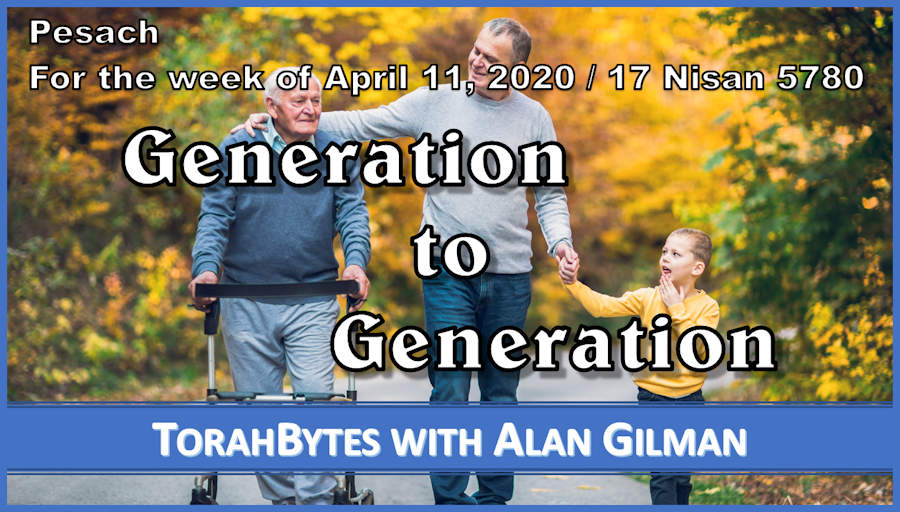For the week of April 11, 2020 / 17 Nisan 5780
Pesach
Torah: Shemot/Exodus 13:1-16; B’midbar/Numbers 28:19-25
Haftarah: Ezekiel 36:37 – 37:14
Download Audio [Right click link to download]
You shall tell your son on that day: It is because of what the LORD did for me when I came out of Egypt. (Shemot/Exodus 13:8)
Pesach (English: Passover) begins this year the evening of Wednesday, April 8. One of the reasons for this annual commemoration of Israel’s freedom from slavery in Egypt is to retain connection from generation to generation, “l’dor vador” as it is said in Hebrew. The ritual aspects of the retelling of the exodus were designed by God to not only remind subsequent generations of this wonderful, foundational story from our history, but to intimately bind our descendants to the original event to the extent that they see themselves as actually there when it happened. Every year when celebrating Pesach, we are to say to our children: “It is because of what the LORD did for me when I came out of Egypt.”
But isn’t this statement for the originals only? Would it not be more correct for the children of the released Hebrew slaves to say, “It is because of what the Lord did for my parents when they came out of Egypt”? Certainly understanding oneself as connected to a historical event through one’s ancestors isn’t identical to being there. That’s technically correct, but technicalities of this sort obscure the depth of meaning found in the intense identification the statement demands.
Even technically, we are far more connected to our history than we normally think. However genetics actually work, the experiences of the past indelibly stamp themselves on our psyches. To some extent, we carry the past with us and pass it on to our children whether we or they are conscious of it. For subsequent generations to benefit from the events of the past, be they good or bad, it’s better to be not only conscious of those events but consciously understand them properly.
From the days of Moses and the departure from Egypt every Jewish person was to regard themselves as a freed slave. To lose that would be to lose the core of our identity and begin to become something that we are not.
Retaining connection to this story is not for the Jewish people alone. When Yeshua leveraged his last Pesach celebration to function as the key reference through which his followers would remember him and his sacrifice, he opened the door for everyone, Jewish or otherwise, to realize the commonality of all peoples. Israel’s oppression to tyranny in Egypt functions as a picture of the oppression of all people to evil. Yeshua’s giving himself as the supreme Passover Lamb, provides freedom to all who trust in him. Just like the Angel of Death passed over those Jewish homes that applied the Passover lamb’s blood to their doorframes in faith, so God’s judgement passes over anyone, Jewish or not, who figuratively places the Messiah’s blood over themselves by trusting in him.
As we tell the story of our deliverance that we inherited from those who have gone before, their story becomes our story. This has never been as important as it is today, when we are facing a global pandemic. In spite of social distancing we are seeing as never before how connected we really are. Rich or poor, young or old, famous or not, the plight of one has become the plight of all. But Pesach reminds us that this plight really isn’t new. The threat of death has been hanging over our lives from generation to generation. Pesach also reminds us that God is the God of deliverance for all. And if we make his deliverance ours as demonstrated by the exodus and offered to all people through the Messiah Yeshua, we will have the opportunity to tell our children, “This is what the Lord did for me.”
Scriptures taken from the English Standard Version
